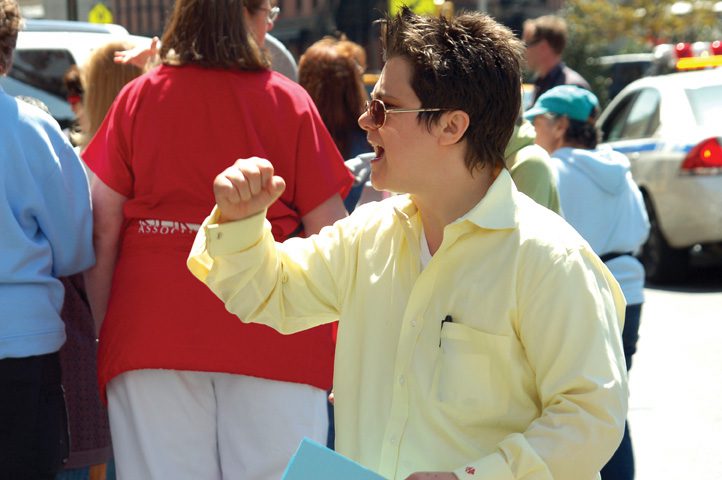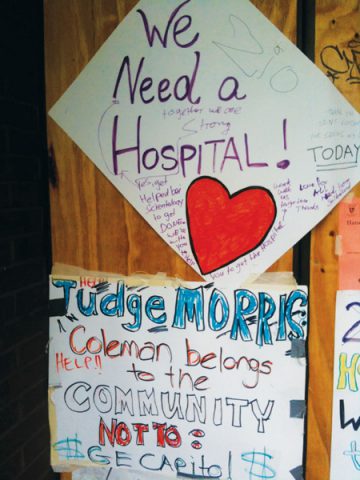Attorney Yetta G. Kurland, GO’s legal columnist and a leader in the movement to restore full healthcare services to the West Village, helped organize the recent ‘100 Days Without A Hospital’ rally at the shuttered St. Vincent’s Hospital. The tremendous turnout at the event highlighted concerns about the gap in community healthcare left by the loss of St Vincent’s, and proved to public officials that Village residents are desperate for neighborhood healthcare—especially services sensitive to LGBT clients.
Kurland spoke to GO about St. Vincent’s’ fate and the ongoing fight for access to comprehensive neighborhood hospital care.
GO: What triggered your involvement with the fight for St. Vincent’s and accessible health care?
Yetta Kurland: When the hospital closed, we
didn’t just lose emergency services. A complex web of healthcare services was shattered, leaving a state of crisis. I live a few blocks from the hospital and the St. Vincent’s closure affected me personally. I received an email from a neighbor, who told me she had stood, for a very long time, outside St. Vincent’s Hospital calling 911 to try to get an ambulance for a man who had collapsed on the street. That made me realize how serious this issue really is, and the closure was actually going to happen, and I realized I had to help galvanize the community.
As an attorney, were you able to use the legal system to try to avoid closure?
We went into state court to ask the judge to force the Department of Health to postpone the closing until it could be done safely, and to direct an investigation into St. Vincent’s finances. The bankruptcy court judge told us we couldn’t ask the state court for this relief because it might adversely impact the amount of money its creditors could get from St. Vincent’s. The judge ruled that we had to go to bankruptcy court to be heard on this issue. We did, but the judge told us we didn’t have standing in bankruptcy court because we weren’t creditors.
A real Catch-22. What was your next move?
We appealed that decision, and we are waiting for the federal court judge to rule on it. We believe citizens have a right to compel their state agencies to comply with the law, and that corporations and creditors shouldn’t be allowed to protect their profits over the rights of the public to access community health care. We hope we will be successful in the court, but we are also organizing in the community and attempting to put pressure on our elected officials to restore these vital services.
Without St. Vincent’s, the closest full-service hospital for West Village residents is Bellevue, on the east side in Kips Bay. That’s bound to affect the huge number of LGBT people in the Village.
St. Vincent’s treated some of the first people affected by HIV and AIDS. The lead plaintiff in our case is a 25-year survivor of HIV/AIDS who purposely lived just three blocks from the hospital where all his doctors practiced.
St. Vincent’s also collaborated with the Callen-Lorde Community Health Center, which serves the LGBT community; the hospital employed many LGBT nurses, staff and doctors who were sensitive to the needs of the our community. This is really a great loss to our community, as well as the neighborhood.
Who’s benefiting most from the closure of St. Vincent’s?
St. Vincent’s claimed it was forced to close because it carried more than a billion dollars in debt. When we looked at the financials, we discovered most of debt had nothing to do with the day-to-day operations of the hospital; rather, the debt had been transferred. Other expenses jumped out at us: more than $10 million for the salaries of 10 executives, millions on consultants and $100 million in unspecified expenditures. It seems the hospital wasn’t losing money so much as it was being run into the ground.
I believe there’s a real estate connection, too. Theoretically, investors could make billions of dollars by closing the hospital and replacing it with luxury residential high-rises on its prime Village real estate. The only way we can get to the truth is obtain documentation through the court, or have our elected officials, like the Attorney General, investigate.
What are the next steps?
We’ve organized a group called The Coalition for a New Village Hospital. People can learn more about the group, join us in the fight,
and help plan our next move by going to demandahospital.blogspot.com.



What Do You Think?